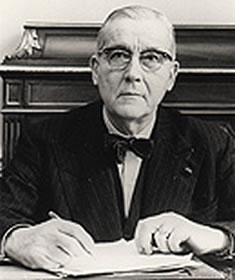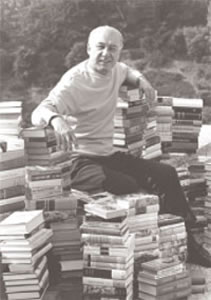De Italiaanse schrijfster Natalia Ginzburg werd geboren op 14 juli 1916 in Palermo. Zie ook mijn blog van 14 juli 2006 en ook mijn blog van 14 juli 2007.
Uit: So ist es gewesen (Vertaald door Maja Pflug)
Ich habe zu ihm gesagt: »Sag mir die Wahrheit«, und er hat gesagt: »Welche Wahrheit? « und zeichnete rasch etwas in seinen Notizblock. Er hat es mir hinterher gezeigt, es war ein langer, langer Zug mit einer großen schwarzen Rauchwolke, und er beugte sich aus dem Zugfenster und winkte mit dem Taschentuch.
Ich habe ihm in die Augen geschossen.
Er hatte mich gebeten, ihm eine Thermosflasche für die Reise fertig zu machen. Ich bin in die Küche gegangen und habe Tee gekocht, Milch und Zucker dazugetan und ihn in die Thermosflasche gefüllt, dann habe ich den Becher fest zugeschraubt und bin ins Arbeitszimmer zurückgegangen. Da hat er mir die Zeichnung gezeigt, und ich habe den Revolver aus seiner Schreibtischschublade genommen und auf ihn geschossen. Ich habe ihm in die Augen geschossen.
Aber ich dachte schon sehr lange, daß ich ihm früher oder später etwas antun würde.
Dann habe ich mir Regenmantel und Handschuhe angezogen und bin gegangen. Ich habe in der Bar einen Kaffee getrunken und bin aufs Geratewohl durch die Stadt gelaufen. Der Tag war recht kühl, und es wehte ein leichter Wind, der nach Regen schmeckte. In den Anlagen habe ich mich auf eine Bank gesetzt, die Handschuhe abgestreift und meine Hände betrachtet. Ich habe den Ehering abgenommen und eingesteckt.
Vier Jahre lang waren wir Mann und Frau. Er sagte mir, daß er mich verlassen wollte, doch dann starb unsere Tochter, und deshalb blieben wir zusammen. Er wollte, daß wir noch ein Kind bekommen, das würde mir guttun, meinte er, so schliefen wir oft zusammen in der letzten Zeit. Aber es gelang uns nicht, noch ein Kind zu bekommen.
Ich kam dazu, wie er Koffer packte, und fragte ihn, wo er hinführe. Er sagte, er führe nach Rom, um mit einem Rechtsanwalt über einen bestimmten Fall zu entscheiden. Ich könnte zu meinen Eltern gehen, dann wäre ich nicht allein zu Haus, solange er fort sei. Er wisse nicht genau, wann er aus Rom zurückkäme, in vierzehn Tagen, in einer Woche, er wisse es nicht. Ich dachte, er käme vielleicht überhaupt nicht wieder. Also habe ich auch Koffer gepackt. Er sagte, ich solle ein paar Romane zum Lesen mitnehmen, damit ich mich nicht langweile. Ich habe den »Jahrmarkt der Eitelkeiten« und zwei Bücher von Galsworthy aus dem Regal genommen und in meinen Koffer gelegt.
Ich habe gesagt: »Alberto, sag mir die Wahrheit«, und er hat erwidert: »Welche Wahrheit«, und ich habe gesagt: »Ihr fahrt zusammen weg«, und er hat gesagt: »Wer, zusammen? « Und hinzugefugt: »Du phantasierst immer herum und verzehrst dich innerlich, indem du dir dauernd schreckliche Sachen vorstellst, und so hast du keine Ruhe und läßt auch den anderen keine Ruhe. «
Er hat zu mir gesagt: »Nimm den Bus, der um zwei in Maona ankommt«, und ich habe geantwortet: »Ja. «
Er hat zum Himmel geschaut und zu mir gesagt: »Am besten ziehst du den Regenmantel und die Gummistiefel an. «
Ich habe gesagt: »Es ist mir lieber, ich weiß die Wahrheit, wie auch immer«, und er hat zu lachen angefangen und gesagt:
Verità va cercando, ch’è si cara,
Come sa chi per lei vita rifiuta.
(Die Wahrheit sucht er, die so teuer, wie der weiß, der für sie sein Leben opfert.)“

Natalia Ginzburg (14 juli 1916 – 7 oktober 1991)
De Franse schrijver en letterkundige Jacques de Lacretelle werd geboren in Cormatin (Saône-et-Loire) op 14 juli 1888. Zie ook mijn blog van 14 juli 2007.
Uit: La Bonifas
« Assurément, cette vieille fille, qui n’avait éprouvé aucun bouleversement sensuel et qui traînait après soi des désirs et des dégoûts de vierge, jugeait, en raisonnant de la sorte, d’après son cas. Toutefois, bien des romanciers ont tendance à faire passer leurs personnages d’une case dans une autre, comme si les époques successives de la vie humaine, enfance, adolescence, âge mûr, étaient analogues aux états tout différents par lesquels passe un insecte. En fait, ces solutions de continuité sont fausses ; il n’est rien qui ne soit inclus en nous dès l’origine ; les transformations de notre nature sont plus spécieuses que réelles ; et, lorsque dans une œuvre de fiction on étudie tout au long un caractère, ce n’est point une habileté d’artiste mais bien une vérité psychologique que de montrer la trame permanente de ce caractère et d’exploiter dans une large mesure le pressentiment. »

Jacques de Lacretelle (14 juli 1888 – 2 januari 1985)
De Russische dichter Gavrila Romanovitsj Derzjavin werd geboren in Kazan op 14 juli 1743. Zie ook mijn blog van 14 juli 2007.
Time’s river
Time’s river in its rushing current
Sweeps all the human deeds away,
And fills an abyss of oblivion
With nations, kingdoms and their kings,
But if there is something remaining
In sounds of lyre or trumpet’s air,
Will enter the Eternal gullet –
And will not flee the common Fate.
God
O Thou, who’s infinite in space,
Alive in ever-moving matter,
Eternal in the flow of time,
God faceless, with a trinity of faces!
Soul unified and omnipresent,
Who needs no place or reason,
Whom none can ever comprehend,
Whose being permeates all things,
Encompassing, creating, guarding,
Thou, called by us God.
Although a great mind might contrive
To fix the ocean’s depths,
To count the sands, the rays of stars,
Thou can’t be summed or fixed!
Enlightened souls who have emerged
From your creative light
Cannot begin to grasp your ways:
Our thought alone aspires to thee,
But in your magnitude is lost,
A moment in eternity.
From depths eternal thou invoked
Primordial substances of chaos
Within thine very self thou birthed
Eternity before all time.
And before time from thine self alone
Thou shinest forth within thyself.
All light originates in thee.
Creating all with but a single word
And reaching forth in new creation,
Thou wast, thou art, and thou will ever be!
Thou incarnate the chain of life,
Thou nourish and sustain it.
Thou joinest starts with ends.
Thou bringest life to all through death.
New suns are born from thee
In flowing streams of sparks.
As on a clear and freezing day,
A hoarfrost dusting shines,
And floats, and churns and sparkles,
As do the stars beneath thy vault.
A multitude of shining spheres
Floats off into infinity.
They all fulfill thy laws,
And cast their vivifying rays.
But all these brilliant lanterns-
This mass of glowing crystal-
This roiling crowd of golden waves-
These burning elements-
Or all these gleaming worlds as one-
Compare to thee like night to day.
Compared to thee the earthly realm
Is like a droplet in the sea.
What is this universe I see?
And what am I, compared to thee?
If, in this airy sea, I wish
To multiply a million worlds
By other worlds a hundred times-
Then venture to compare the sum to thee,
All this would be a tiny speck;
So I, compared to thee, am naught.
I’m Naught! But thou shinest through me
With all the splendor of your virtue;
Thou showest yourself through me
Like sun inside a tiny water drop.
I’m Naught! But still I can feel life,
Like something hungering I fly,
I’m always soaring high above.
To be with you is my soul’s wish,
It contemplates, reflects and thinks:
If I exist-thou art as well.
Thou art! As nature’s order shows,
My heart affirms the same to me,
My reason’s sure of it:
Tho art-And I’m no longer naught!
A fraction of the universe’s whole,
It seems that I repose in nature’s
Critical center where you started
With the creation of corporeal beasts,
And ended with the heav’nly spirits:
Through me, you fused the chain of life.
I am the link of all existing worlds,
I am the outer brink of matter,
I am the focal point of living things,
I am the starting place of the divine;
Although my flesh rots into ash,
My mind commands the thunderbolts,
I’m king-I’m slave – I’m worm-I’m God!
But though I am miraculous,
Whence did I come?-that no one knows.
I could not by myself have risen.
Creator, I am your invention!
I am a creature of your wisdom.
O, source of life, bestower of blessings,
My soul and king!
According to your iron laws
My self eternal must needs pass
Across the borne of death;
My spirit’s clothed in mortal garb
And I return through death alone,-
To your eternity – O, father!-
Thou art inscrutable, transcendent!
I understand that all my soul’s
Imaginings are powerless
Your shadow to describe;
But when thou must be glorified
To pay such tribute we frail men
One course alone can follow.
We venture upwards to thy realm,
To lose ourselves in thy vast otherness
And shed our tears of gratitude.

Gavrila Derzjavin (14 juli 1743 – 20 juli 1816)
De Amerikaanse schrijver Irving Stone werd geboren op 14 juli 1903 in San Francisco. Zie ook mijn blog van 14 juli 2007.
Uit: Der Schöpfung wunderbare Wege (Vertaald door Willy Thaler)
“Er stand vor seinem Rasiertisch aus Mahagoni und rührte mit dem Rasierpinsel in der weißen Rasierschale mit den blauen
Blumen, goss heißes Wasser aus einem Kupferkrug hinzu, seifte sein hellhäutiges Gesicht ein und klappte sein scharf
geschliffenes Rasiermesser mit dem Ebenholzgriff auf.
Für den zweiundzwanzigjährigen Charles Darwin war das Rasieren eine angenehme, wenig schwierige Aufgabe, denn
er trug seinen rötlich braunen Backenbart bis zum Kinn. Er brauchte also nur seine rosa Wangen und das runde Kinn zu
rasieren. Seine roten Lippen waren recht kurz geraten im Vergleich zu der Größe seiner braunen, purpurgesprenkelten
Augen, die alles beobachteten und registrierten.
Er säuberte sein Gesicht vom Seifenschaum, nahm zwei Bürsten mit silbernem Rücken und scheitelte sein langes karottenrotes Haar sorgfältig, sodass es fast sein ganzes rechtes Ohr bedeckte, dann bürstete er den übrigen dichten Schopf quer über seinen großen Kopf, bis er in einem eleganten Schwung über sein linkes Ohr fi el. Er nahm ein frisches weißes Hemd aus der Kommode aus Nussholz, knöpfte den gestärkten weißen Kragen zu, dessen Spitzen seinen Bart umrahmten, legte eine dunkelbraune Krawatte um den hohen Kragen und band eine große Schleife. Gewöhnlich rasierte er sich, wenn er am Morgen aufstand, aber er hatte den Tag auf dem Severn im Familienruderboot mit Fischen und Sammeln verbracht und das Ankleiden bis zu dem Zeitpunkt hinausgeschoben, an dem er Professor Adam Sedgwick empfangen sollte.

Irving Stone (14 juli 1903 – 26 augustus 1989)
Zie voor onderstaande schrijvers ook mijn blog van 14 juli 2007.
De Amerikaanse schrijver, scenarioschrijver en regisseur Arthur Laurents is geboren in New York op 14 Juli 1918.
De Amerikaanse schrijver Owen Wister werd geboren op 14 juli 1860 in Germantown, Pennsylvania.






